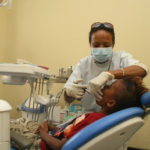The African region has recorded a 4% annual decline rate in tuberculosis (TB) cases. Although the rate is double the global pace, the region risks missing major milestones and targets to end the disease if efforts are not scaled up rapidly.
The World Health Organization’s (WHO) End TB Strategy calls for countries to reduce TB deaths by 75% and cases by 50% by 2025 compared with the 2015 levels. To cross the 2025 milestone, the annual pace of reduction should reach 10% per year.
Yet despite the slowing pace towards the 2025 target, the African region has made progress in recent years. For example, TB deaths in the region fell by 26% between 2015 and 2021, with high burden TB countries surpassing initial targets to lower TB cases. Accelerating TB elimination progress is crucial. This year World TB Day is being marked today under the theme “Yes, we can end TB” to spur national action to bolster TB prevention and control.
“African countries have made remarkable progress against TB. The question is no longer about whether we can end TB, but how fast we must act to reduce the disease burden, save lives and maintain a high momentum towards a TB-free world,” said Dr Matshidiso Moeti, WHO Regional Director for Africa.
The End TB Strategy also sets 2030 targets to cut TB deaths by 90% and cases by 80% for which the annual reduction progress must be accelerated to 17%, and further reductions to realize the 2035 vision of a world free of TB.
African countries have increased the uptake of new WHO-recommended tools and guidance, resulting in early access to TB prevention and care and better outcomes. The proportion of people diagnosed with TB who were initially tested with a rapid diagnostic, for example, increased from 34% in 2020 to 43% in 2021.
However, major barriers to ending TB persist. They include limited access to health services, inadequate health infrastructure, insufficient quality of care, inadequate human and financial resources for health and inadequate social protection.
Underinvestment by governments in TB control programmes is a significant drawback to the fight against the disease. For instance, of the estimated US$ 3.9 million required for the African region’s 2018–2021 TB response plan, only US$ 957 million were mobilized each year for prevention, diagnosis and treatment of the disease.
Africa still records a significant gap between the estimated number of TB cases and those that are diagnosed. In 2021, the latest year for which data is available, an estimated 40% of cases were not reported or diagnosed. The region also accounts for 23% of the estimated global TB burden and over 33% of global TB deaths.
In September, a high-level meeting on TB will be held during the UN General Assembly bringing together heads of state to help ramp up action and accelerate TB control efforts.
“TB control efforts require concerted action by all: communities, governments, the private sector and international partners. Our region still suffers an unacceptably high TB toll. Without robust joint efforts, this preventable and treatable disease will remain a serious public health threat with costly impacts for individuals and societies,” Dr Moeti said.








